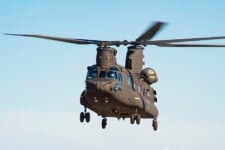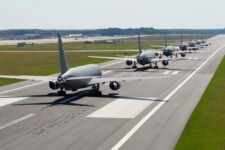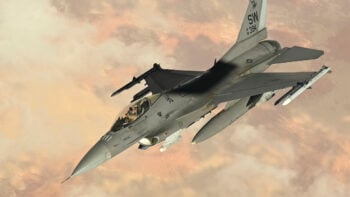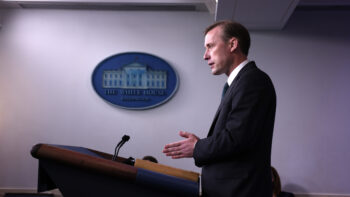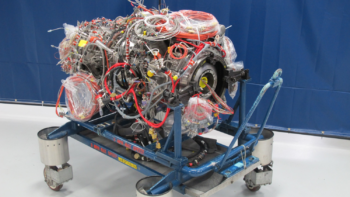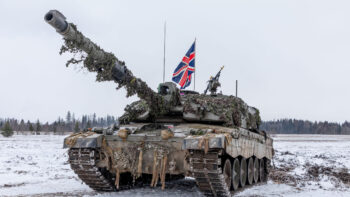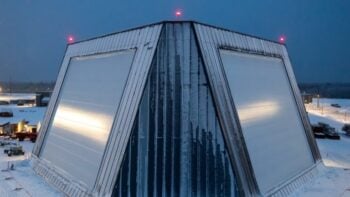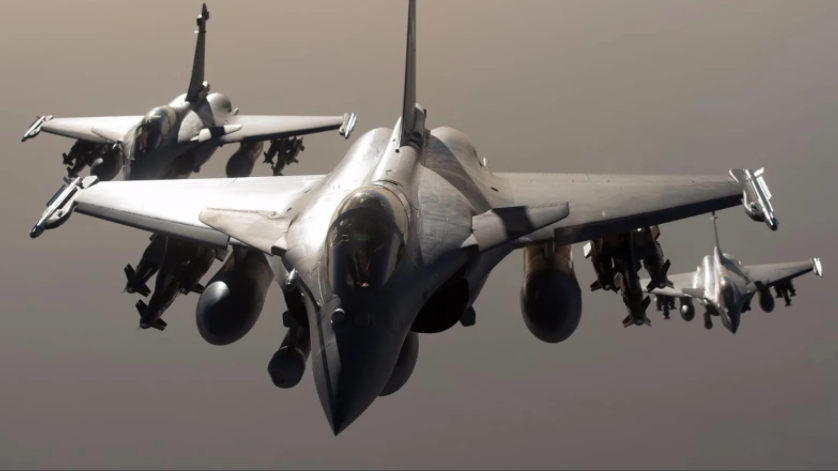
Rafale jets in flight (Dassault Aviation)
BEIRUT: When the UAE surprisingly announced a $19 billion deal between Abu Dhabi and Paris for the acquisition of 80 Rafale fighters last week, it caught the military world by surprise. Now the question experts are hashing out is what impact, if any, the Rafale agreement will have on the UAE’s unofficially-frozen efforts to procure the American F-35.
Regardless of which side of the argument one comes down on, it is clear that the agreement with France is at least somewhat a message to Washington that the Emirates have options should the Biden administration continue to block movement on the F-35 procurement.
“This is a clear sign that the UAE will not cancel its 5G contract with the Chinese and expect the US to continue holding the F-35 deal for now,” a knowledgeable UAE military source told Breaking Defense.
The UAE will be the first to operate the F-4 version of the Rafale outside France. With improved capabilities including upgraded radar sensors and front sector optronics and helmet-mounted display, the aircraft will be fitted with new weapons like the Mica NG air-to-air missile and 1,000-kg AASM Air-to-Ground Modular Weapon.
“After the Mirage 5 and Mirage 2000, this Rafale contract consolidates the strategic relationship that binds our two countries and the satisfaction of the Emirates Air Force, a long-standing and demanding partner of our company,” Eric Trappier, Chairman and CEO of Dassault Aviation said in a statement.
The deal did not emerge entirely from thin air, as the two sides have been negotiating on and off since the late nineties. The deal would have taken place if the UAE had not had two conditions: the first is to have a version of the Rafale that can carry American-made weapons, not only French or European, and the second to make the Emirati model of the Rafale a platform for continuous development. Dassault did not agree on both terms so the Emiratis withdrew from the negotiations in 2011.
The UAE Air Force then turned its attention to other promising rival aircraft such as the F-15E, Typhoon and Super Hornet, but also began to focus its attention on the F-35 fighter — seen as a long shot for years, but finally ok’d by the Trump administration. Sources say the Biden administration has been holding up movement on the F-35 agreement in order to pressure the UAE to abandon ties with China’s Huawei corporation.
“Today, the UAE got what it initially asked for,” said Kuwaiti defense expert Ali Al Hashim, “plus a very warm welcome from Paris.”
There was a belief the UAE would threaten to sign on to Russia’s Su-75 Checkmate in order to push Washington to move forward on the F-35 deal. Instead, they reached into the past and pulled the Rafale agreement out of a hat.
RELATED: Russians in the desert: Moscow seeks to upend the Middle East export market
“Considering that French-UAE negotiations have dragged on for a decade, it is difficult to see the sudden agreement for so many aircraft at such a pivotal moment as coincidental,” said Brandon C. Patrick, a Mid-East defense analyst. “The UAE may be hoping to signal its impatience or its motivation to finalize the deal.”
That doesn’t mean the Rafael deal is a pure political play, however. There are real reasons for the UAE to want to invest in both.
“Combined with the 50 F-35’s currently on order with Lockheed Martin, these 80 Rafale amount to a total replacement of the more than 130 F-16’s and Mirage 2000’s that comprise the current Emirati fighter fleet,” Patrick said.
As it stands, most the UAE’s 138 mission-ready fighters are US-made, with 80 F-16E/F’s and some 53 French-made Mirage 2000-5D/E. So, “UAE acquisition efforts over the last two years [flipped] those numbers, with French-made tails now comprising the majority of the UAE fighter fleet,” Patrick noted.
Even though Washington and Abu Dhabi enjoy broadly good relations under the Biden administration, the state’s leaders are concerned with the US withdrawal from the region.
“This perception was further reinforced by US withdrawal from Afghanistan,” said Gawdat Bahgat, Professor of national security at the National Defense University’s Near East South Asia Center for Strategic Studies. “That’s why the UAE senior leaders have thought to mend fences with regional rivals including Turkey and Iran and deepen relations with Israel.”
While it may send a message to Washington that the UAE is not sole-source beholden, Bahgat is skeptical that the Rafale agreement will preclude the F-35 moving forward. “The UAE still maintains close military and strategic ties with the US, but does not put all its eggs in one basket,” he said. “So, the Rafale jets deal is part of this strategy.”
Certainly, the US has more reservations over cooperation with Beijing than with Paris. “An important challenge that the UAE faces is the compatibility of these weapon systems from different countries,” he added.
Ultimately, the US and UAE are strong partners with mutual interest in continuing their defense relationship, “and the F-35 is integral to that goal,” added Patrick.
But now that the UAE is getting the latest version of the Rafale, providing the Air Force with some 5th generation capabilities, “it might push the Americans back to renegotiate the F-35 deal with more ease conditions,” believes Al Hashim.
What remains to be seen however is “whether this trend continues in other areas of defense procurement, and what that portends for the US-UAE defense relationship, if anything,” Patrick said. “US weapons technology has long been a symbol of status and capability in the Gulf region.”
This new move by the UAE may signal a shift in that perception, “an improvement in some Gulf states’ perception of European fighter technology, or both. In either case, US policymakers and Lockheed executives are certain to take notice,” he concluded.
For its part, the UAE is sticking to the line that the Rafale is not a replacement for the F-35.
“The signed contract with France is not a substitute for the US F-35 ongoing discussions,” Maj. Gen. Staff Pilot Ibrahim Nasser Al Alawi, UAE Commander of the Air Force and Air Defense, told UAE’s news agency WAM. “It’s rather a complementary to our Air Force capabilities as we continue to develop our air defense systems and seek new products and advanced technologies as part of our overall National Security Strategy.”
Northrop sees F-16 IVEWS, IBCS as ‘multibillion dollar’ international sales drivers
In addition, CEO Kathy Warden says the company sees a chance to sell up to five Triton UAVs to the NATO alliance.


